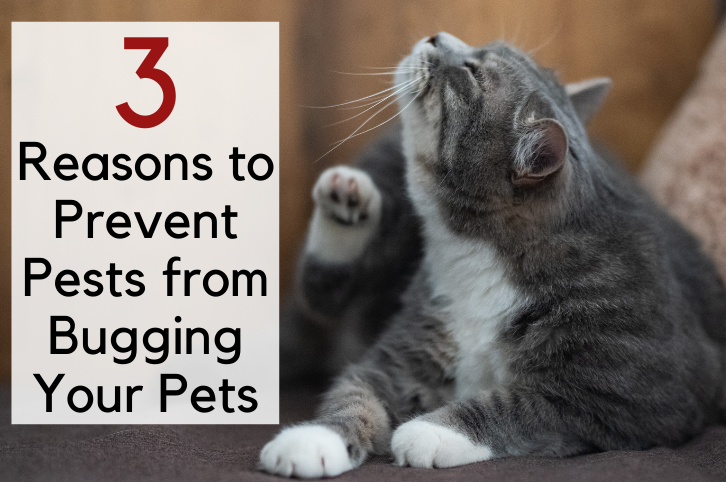Summer is one of our favorite times of the year at Homey Gnome. Not only do we get to enjoy all the beautiful summer flowers that are in bloom, but we also get to see a wide variety of pet patients. There are a few things that really bug us about summer, though–fleas, ticks, mosquitos, and heartworms to be exact. These pesky little parasites may seem harmless, but they can really take a big bite out of your pet’s health. Why should you dislike these parasites as much as we do?
1. Fleas Can Do a Number on Your Pet’s Health
Did you know that fleas can eat 15 times their body weight in blood? It’s true and totally gross. And while a flea barely weighs more than a grain of sand, they can really take a bite out of your pet’s well being when you begin to do that math. What’s the equation? For every flea you see, there are 50 more that are hidden in your home or buried in your pet’s fur.
Together, these feisty fleas can cause your pet to become anemic through a loss of blood. Fleas can also spread tapeworms, which rob your pet of nutrients. These nearly-microscopic bugs can also transmit cat scratch fever to your cat, which humans can also catch.
What else should you know about fleas? They can cause pets extreme mental distress. Fleas bite and startle pets and prevent them from enjoying a good night’s sleep. For some unlucky pets, the pain and agony are compounded by an allergy to flea saliva.
2. Even the Tiniest Ticks Can Transmit Disease
Hiding in tall grasses, wildflowers, and shrubs, you can find the terrifying, terrible tick! These arachnids are the vampire cousins of spiders with a knack for contracting then spreading diseases like Lyme disease, Rocky Mountain spotted fever, and Ehrlichiosis. These painful diseases cause pain and irreversible damage to your pet’s body. And not to scare you, but these diseases can go unnoticed for months. Some pets don’t show any signs of illness.
3. Heartworm Disease Can Be Fatal
We all hate mosquitos. Here’s another reason they deserve all the contempt we feel for them: Mosquitos spread heartworm larvae. All it takes is one bite from an infected mosquito for a pet to become a victim of heartworm disease.
As for heartworms, they enter a pet’s bloodstream as larvae, then spend six to seven months growing into adults. From there, they lengthen and multiply. Over time, heartworms make it difficult for an animal’s heart to pump enough blood around the body for the pet to survive. When left undiagnosed and untreated, heartworm disease is 100% fatal for dogs. Sadly, there is no treatment for cats with heartworms.
Before you fall back on the idea that a dog’s heartworms can be treated, it’s important for dog owners to understand that heartworm treatment is both difficult and costly. Furthermore, heartworms can cause organ damage that cannot be undone.
What Can You Do to Protect Your Pet?
Protecting your pet isn’t rocket science. All it takes is a bit of precaution, a prescription, and consistency.
The most effective way to keep your pet from being a victim of summer pests is to provide your pet with prescription flea, tick, and heartworm medications. Remember to not skip any doses.
You also want to be mindful and respond quickly should you notice signs of these parasites.
- One way to spot fleas is to look for “flea dirt,” which is a nice-ish way of saying flea poop. This dirt looks like tiny brown or black grains under your pet’s fur and where they sleep. Another warning sign is that your pet may look startled, softly cry or whimper, then go to town scratching.
- When it comes to ticks, you may notice your pet targeting one area where they’re extra itchy. After hikes, walks, or time outside, you can also check your pet’s ears, armpits, belly, and the space between their toes.
- Heartworms can make it difficult to breathe. This can show itself if your pet is wheezing, coughing, hacking, or having trouble catching their breath.
Tell Summer Pests What You Think of Them with Effective Prevention
We know you love your pets. Show them that you love them by protecting their hearts, mental wellbeing, and everything in between. We’re here to help. Make an appointment to learn more about the medications we offer that put pests in their place.
Image credit: Pixabay


